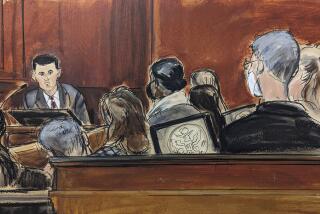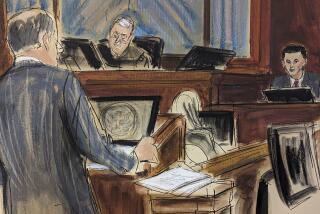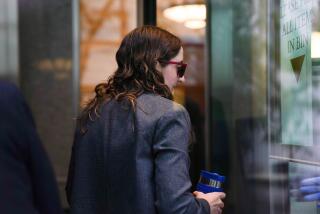Bank of America CEO denies government coercion in Merrill Lynch takeover
- Share via
WASHINGTON — Bank of America Corp. Chief Executive Kenneth Lewis told members of Congress on Thursday that he was not coerced by the government into going ahead with the acquisition of Merrill Lynch & Co. late last year after he learned of huge new losses at the brokerage giant.
But some members of the House Oversight and Government Reform Committee were openly skeptical. “We don’t buy it,” said Rep. Elijah E. Cummings (D-Md.).
Rep. Jeff Flake (R-Ariz.) was equally incredulous. After Lewis quoted then-Treasury Secretary Henry M. Paulson as saying the bank’s top officials could be fired if they pulled out of the deal, Flake asked Lewis:
“If this wouldn’t be considered a threat, what would be considered a threat? I mean, kidnap the family dog?”
The panel’s top Republican, Rep. Darrell Issa of Vista, Calif., blamed “financial vigilantes” at the Treasury and the Federal Reserve.
The government was pressing for the acquisition to keep Merrill from collapsing and possibly pushing the tottering financial system over the edge.
Not all lawmakers saw Lewis as the victim. Some said he might have used the threat of pulling out of the deal to secure more federal bailout money.
“The Treasury Department provided $20 billion for a shotgun wedding,” said Rep. Edolphus Towns (D-N.Y.), the committee’s chairman. “But the question may be ‘Who was holding the shotgun?’ ”
Lewis’ testimony offered a rare glimpse of events behind the scenes during the tumultuous days of government efforts to respond to the financial crisis. The bank’s $50-billion purchase of Merrill Lynch has drawn the scrutiny of congressional investigators because the bank needed an additional $20 billion in federal bailout money after the takeover.
As the deal neared completion, Lewis testified, he grew nervous after learning that Merrill Lynch was facing huge financial losses that would sharply reduce the value of the firm Bank of America was buying.
In mid-December, Lewis called Paulson, who was out on a bicycle ride when the call went through.
After warning, “I want to give you some blunt language,” the Treasury secretary said during the phone conversation that he felt “very strongly” that the deal should proceed, the Bank of America CEO said.
Lewis did not accuse federal officials of acting improperly. He acknowledged that the pressure he received from them was “a strong influence on my decision, but it wasn’t the only influence.” He said he believed that the federal officials he was in contact with acted with “good intentions,” seeking to prevent any further economic calamity.
And Lewis defended the Merrill Lynch purchase, saying it “made sense for Bank of America and its shareholders and made sense for the stability of the markets.”
Citing the importance of the takeover to the stability of the financial system, he added, “Even six months later, it is easy to forget just how close to the brink our system came.”
Lewis had previously told the New York state attorney general’s office that Paulson and Fed Chairman Ben S. Bernanke had told him that he and the bank’s board would be ousted -- and the financial system would suffer a serious blow -- if the bank called off its purchase of Merrill Lynch.
The committee plans to ask Paulson and Bernanke to testify.
In taking aim at Lewis, a number of lawmakers cited internal Fed e-mails suggesting that Lewis should have known about Merrill’s losses earlier.
“Ken Lewis’ claim that they were surprised by the rapid growth of the losses seems somewhat suspect,” a Fed official wrote in a Dec. 13 e-mail.
Asked whether he wasn’t obligated to disclose to shareholders his concerns about growing losses at Merrill Lynch, Lewis said, “I’d leave that decision to our securities lawyers. . . . I am not a securities lawyer.”
--
More to Read
Inside the business of entertainment
The Wide Shot brings you news, analysis and insights on everything from streaming wars to production — and what it all means for the future.
You may occasionally receive promotional content from the Los Angeles Times.











